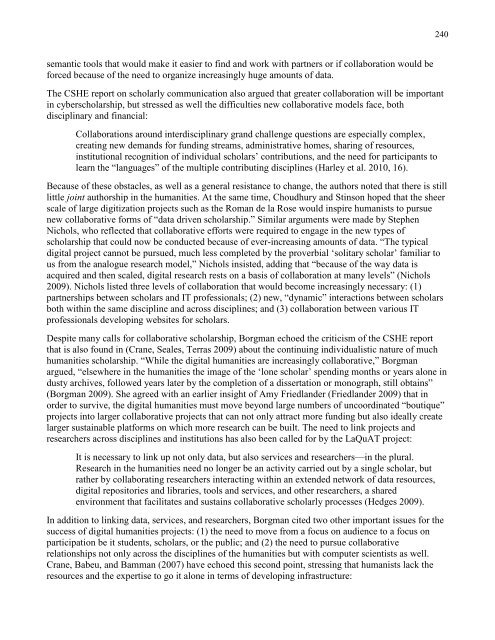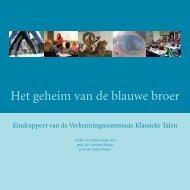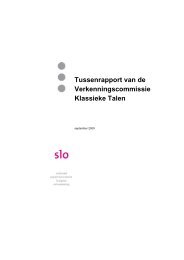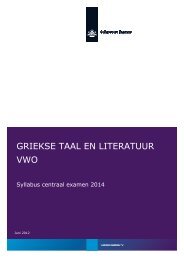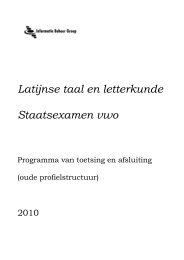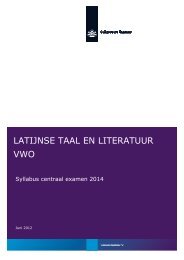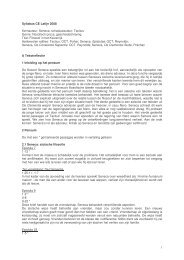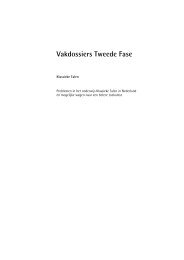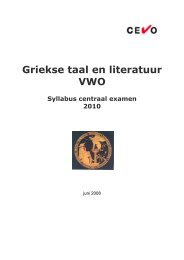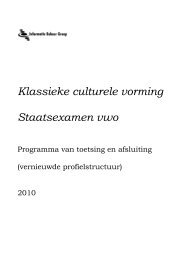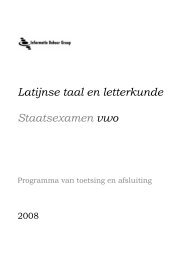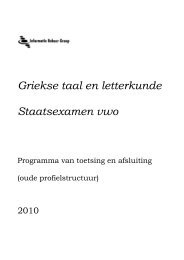Rome Wasn't Digitized in a Day - Council on Library and Information ...
Rome Wasn't Digitized in a Day - Council on Library and Information ...
Rome Wasn't Digitized in a Day - Council on Library and Information ...
Create successful ePaper yourself
Turn your PDF publications into a flip-book with our unique Google optimized e-Paper software.
240<br />
semantic tools that would make it easier to f<str<strong>on</strong>g>in</str<strong>on</strong>g>d <strong>and</strong> work with partners or if collaborati<strong>on</strong> would be<br />
forced because of the need to organize <str<strong>on</strong>g>in</str<strong>on</strong>g>creas<str<strong>on</strong>g>in</str<strong>on</strong>g>gly huge amounts of data.<br />
The CSHE report <strong>on</strong> scholarly communicati<strong>on</strong> also argued that greater collaborati<strong>on</strong> will be important<br />
<str<strong>on</strong>g>in</str<strong>on</strong>g> cyberscholarship, but stressed as well the difficulties new collaborative models face, both<br />
discipl<str<strong>on</strong>g>in</str<strong>on</strong>g>ary <strong>and</strong> f<str<strong>on</strong>g>in</str<strong>on</strong>g>ancial:<br />
Collaborati<strong>on</strong>s around <str<strong>on</strong>g>in</str<strong>on</strong>g>terdiscipl<str<strong>on</strong>g>in</str<strong>on</strong>g>ary gr<strong>and</strong> challenge questi<strong>on</strong>s are especially complex,<br />
creat<str<strong>on</strong>g>in</str<strong>on</strong>g>g new dem<strong>and</strong>s for fund<str<strong>on</strong>g>in</str<strong>on</strong>g>g streams, adm<str<strong>on</strong>g>in</str<strong>on</strong>g>istrative homes, shar<str<strong>on</strong>g>in</str<strong>on</strong>g>g of resources,<br />
<str<strong>on</strong>g>in</str<strong>on</strong>g>stituti<strong>on</strong>al recogniti<strong>on</strong> of <str<strong>on</strong>g>in</str<strong>on</strong>g>dividual scholars’ c<strong>on</strong>tributi<strong>on</strong>s, <strong>and</strong> the need for participants to<br />
learn the “languages” of the multiple c<strong>on</strong>tribut<str<strong>on</strong>g>in</str<strong>on</strong>g>g discipl<str<strong>on</strong>g>in</str<strong>on</strong>g>es (Harley et al. 2010, 16).<br />
Because of these obstacles, as well as a general resistance to change, the authors noted that there is still<br />
little jo<str<strong>on</strong>g>in</str<strong>on</strong>g>t authorship <str<strong>on</strong>g>in</str<strong>on</strong>g> the humanities. At the same time, Choudhury <strong>and</strong> St<str<strong>on</strong>g>in</str<strong>on</strong>g>s<strong>on</strong> hoped that the sheer<br />
scale of large digitizati<strong>on</strong> projects such as the Roman de la Rose would <str<strong>on</strong>g>in</str<strong>on</strong>g>spire humanists to pursue<br />
new collaborative forms of “data driven scholarship.” Similar arguments were made by Stephen<br />
Nichols, who reflected that collaborative efforts were required to engage <str<strong>on</strong>g>in</str<strong>on</strong>g> the new types of<br />
scholarship that could now be c<strong>on</strong>ducted because of ever-<str<strong>on</strong>g>in</str<strong>on</strong>g>creas<str<strong>on</strong>g>in</str<strong>on</strong>g>g amounts of data. “The typical<br />
digital project cannot be pursued, much less completed by the proverbial ‘solitary scholar’ familiar to<br />
us from the analogue research model,” Nichols <str<strong>on</strong>g>in</str<strong>on</strong>g>sisted, add<str<strong>on</strong>g>in</str<strong>on</strong>g>g that “because of the way data is<br />
acquired <strong>and</strong> then scaled, digital research rests <strong>on</strong> a basis of collaborati<strong>on</strong> at many levels” (Nichols<br />
2009). Nichols listed three levels of collaborati<strong>on</strong> that would become <str<strong>on</strong>g>in</str<strong>on</strong>g>creas<str<strong>on</strong>g>in</str<strong>on</strong>g>gly necessary: (1)<br />
partnerships between scholars <strong>and</strong> IT professi<strong>on</strong>als; (2) new, “dynamic” <str<strong>on</strong>g>in</str<strong>on</strong>g>teracti<strong>on</strong>s between scholars<br />
both with<str<strong>on</strong>g>in</str<strong>on</strong>g> the same discipl<str<strong>on</strong>g>in</str<strong>on</strong>g>e <strong>and</strong> across discipl<str<strong>on</strong>g>in</str<strong>on</strong>g>es; <strong>and</strong> (3) collaborati<strong>on</strong> between various IT<br />
professi<strong>on</strong>als develop<str<strong>on</strong>g>in</str<strong>on</strong>g>g websites for scholars.<br />
Despite many calls for collaborative scholarship, Borgman echoed the criticism of the CSHE report<br />
that is also found <str<strong>on</strong>g>in</str<strong>on</strong>g> (Crane, Seales, Terras 2009) about the c<strong>on</strong>t<str<strong>on</strong>g>in</str<strong>on</strong>g>u<str<strong>on</strong>g>in</str<strong>on</strong>g>g <str<strong>on</strong>g>in</str<strong>on</strong>g>dividualistic nature of much<br />
humanities scholarship. “While the digital humanities are <str<strong>on</strong>g>in</str<strong>on</strong>g>creas<str<strong>on</strong>g>in</str<strong>on</strong>g>gly collaborative,” Borgman<br />
argued, “elsewhere <str<strong>on</strong>g>in</str<strong>on</strong>g> the humanities the image of the ‘l<strong>on</strong>e scholar’ spend<str<strong>on</strong>g>in</str<strong>on</strong>g>g m<strong>on</strong>ths or years al<strong>on</strong>e <str<strong>on</strong>g>in</str<strong>on</strong>g><br />
dusty archives, followed years later by the completi<strong>on</strong> of a dissertati<strong>on</strong> or m<strong>on</strong>ograph, still obta<str<strong>on</strong>g>in</str<strong>on</strong>g>s”<br />
(Borgman 2009). She agreed with an earlier <str<strong>on</strong>g>in</str<strong>on</strong>g>sight of Amy Friedl<strong>and</strong>er (Friedl<strong>and</strong>er 2009) that <str<strong>on</strong>g>in</str<strong>on</strong>g><br />
order to survive, the digital humanities must move bey<strong>on</strong>d large numbers of uncoord<str<strong>on</strong>g>in</str<strong>on</strong>g>ated “boutique”<br />
projects <str<strong>on</strong>g>in</str<strong>on</strong>g>to larger collaborative projects that can not <strong>on</strong>ly attract more fund<str<strong>on</strong>g>in</str<strong>on</strong>g>g but also ideally create<br />
larger susta<str<strong>on</strong>g>in</str<strong>on</strong>g>able platforms <strong>on</strong> which more research can be built. The need to l<str<strong>on</strong>g>in</str<strong>on</strong>g>k projects <strong>and</strong><br />
researchers across discipl<str<strong>on</strong>g>in</str<strong>on</strong>g>es <strong>and</strong> <str<strong>on</strong>g>in</str<strong>on</strong>g>stituti<strong>on</strong>s has also been called for by the LaQuAT project:<br />
It is necessary to l<str<strong>on</strong>g>in</str<strong>on</strong>g>k up not <strong>on</strong>ly data, but also services <strong>and</strong> researchers—<str<strong>on</strong>g>in</str<strong>on</strong>g> the plural.<br />
Research <str<strong>on</strong>g>in</str<strong>on</strong>g> the humanities need no l<strong>on</strong>ger be an activity carried out by a s<str<strong>on</strong>g>in</str<strong>on</strong>g>gle scholar, but<br />
rather by collaborat<str<strong>on</strong>g>in</str<strong>on</strong>g>g researchers <str<strong>on</strong>g>in</str<strong>on</strong>g>teract<str<strong>on</strong>g>in</str<strong>on</strong>g>g with<str<strong>on</strong>g>in</str<strong>on</strong>g> an extended network of data resources,<br />
digital repositories <strong>and</strong> libraries, tools <strong>and</strong> services, <strong>and</strong> other researchers, a shared<br />
envir<strong>on</strong>ment that facilitates <strong>and</strong> susta<str<strong>on</strong>g>in</str<strong>on</strong>g>s collaborative scholarly processes (Hedges 2009).<br />
In additi<strong>on</strong> to l<str<strong>on</strong>g>in</str<strong>on</strong>g>k<str<strong>on</strong>g>in</str<strong>on</strong>g>g data, services, <strong>and</strong> researchers, Borgman cited two other important issues for the<br />
success of digital humanities projects: (1) the need to move from a focus <strong>on</strong> audience to a focus <strong>on</strong><br />
participati<strong>on</strong> be it students, scholars, or the public; <strong>and</strong> (2) the need to pursue collaborative<br />
relati<strong>on</strong>ships not <strong>on</strong>ly across the discipl<str<strong>on</strong>g>in</str<strong>on</strong>g>es of the humanities but with computer scientists as well.<br />
Crane, Babeu, <strong>and</strong> Bamman (2007) have echoed this sec<strong>on</strong>d po<str<strong>on</strong>g>in</str<strong>on</strong>g>t, stress<str<strong>on</strong>g>in</str<strong>on</strong>g>g that humanists lack the<br />
resources <strong>and</strong> the expertise to go it al<strong>on</strong>e <str<strong>on</strong>g>in</str<strong>on</strong>g> terms of develop<str<strong>on</strong>g>in</str<strong>on</strong>g>g <str<strong>on</strong>g>in</str<strong>on</strong>g>frastructure:


